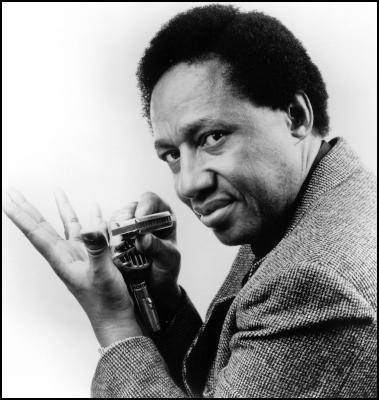Jazz Festival Review: Billy Boy Arnold
Review by Tyler Hersey
Click to enlarge
Billy Boy Arnold
The
Frontroom
November 7, 8pm
Why are the blues so
universal in appeal? How did a genre of music derived from
the hardships faced by post-sharecropping African-Americans
in the first half of the 20th century become one of the most
enduring art forms in the world? Taken literally, the blues
is a simple musical template based on predictable chord
progressions and lyric lines repeated ad infinitum. So how,
in this age of programmed drum beats and digital
synthesizers, can a 70 year old black man from Chicago touch
a roomful of white New Zealanders with nothing but a cocked
half smile and a fistful of whisky tinged verses about his
sexual bravado?
The answer to this question was embodied by seminal Chicago singer and harmonica player Billy Boy Arnold on Tuesday night before a packed house at the Frontroom. Entering from stage right in a wide-legged orange suit with sixties-era lapels, Arnold’s cool demeanor and imposing frame showed the enthusiastic audience that the blues is a feeling, an attitude, and most importantly, a way of life.
Arnold began his career on the street corners of South Chicago, playing harmonica and singing with Ellis McDaniels, a boogie woogie blues guitarist who later took a name suggested by Arnold to became the legendary Bo Diddley. The pair wrote a number of seminal blues songs together, but when the time came to record, record label impresario Leonard Chess declared Diddley the star of the show. While Diddley soon scored a string of national hits at Chess Records, Arnold walked across the street to rival VeeJay Records to record under his own name. But whereas Diddley traded mostly on his upbeat “shave and a haircut” strumming rhythm (also known as hambone), Arnold’s blues took on a straight-forward, simmering machismo.
By the mid 1960's, Arnold’s songs had been covered by British invasion acts like The Animals and Eric Clapton-era Yardbirds, who had taken the black legacy of the blues and marketed it to the burgeoning white middle class on both sides of the Atlantic. But while many of these white performers went on to make a fortune off the backs of their black idols, demand for the original bluesmen waned in the late 60s and Arnold spent the better part of the next two decades as a bus driver and parole officer in Chicago.
In the midst of a career revival, Arnold’s stage presence at the Frontroom was cooler than the rainy night outside. He came off as less a performer than a man who simply displayed his life on stage. With a black and white Fender Stratocaster strapped around his shoulder and a selection of harmonicas rustling in his suit pockets, Arnold led his Wellington-based backing band through a wide selection of material ranging from his very first single “Hello Stranger” - recorded when he was just 18 - to a number of original and traditional songs taken from his 1990's comeback albums.
Each tune started with Arnold picking out a classic riff on the low strings of his guitar, joined soon thereafter by the band made up of local blues guitar legend Darren Watson, rock-steady drummer Ross Burge, unfailing bass player Nick Bollinger and the often explosive piano work of Simen Taylor. The musicianship was excellent, though an obvious lack of preparation time led to a couple of false starts. But once the train got rolling, Arnold and the band became a tight unit of blues power, often steaming through a number of blues classics without stopping. “Once I got ya in the groove, I’m gonna keep ya there,” Arnold proclaimed after a fantastic medley which romped through “Stormy Monday” by T-Bone Walker and a wonderful take on “She Left Me A Mule to Ride” by Sonny Boy Williamson, whose harmonica playing was a major influence on Arnold in the late 1940's.
From fast shuffle to swing ballad, Arnold’s funky harmonica fills kept every head bobbing and sent fans into the aisles to dance. Early in the show, there was a disparity between the frenetic guitar work by Watson and Arnold’s calm demeanor and dry delivery. But after a particularly tasteful and melodic guitar solo on “Man of Considerable Taste”, Watson and Arnold were on the same page, trading licks and fills like old band mates. The backing band wore huge grins for the entire performance, and were clearly thrilled to be receiving a first hand education in the feeling, attitude and way of life that makes the blues.
Wellington International Jazz festival homepage: www.jazzfestival.co.nz



 Ramzy Baroud: The World Owes Palestine This Much - Please Stop Censoring Palestinian Voices
Ramzy Baroud: The World Owes Palestine This Much - Please Stop Censoring Palestinian Voices Dee Ninis, The Conversation: Why Vanuatu Should Brace For Even More Aftershocks After This Week’s Deadly Quakes: A Seismologist Explains
Dee Ninis, The Conversation: Why Vanuatu Should Brace For Even More Aftershocks After This Week’s Deadly Quakes: A Seismologist Explains Martin LeFevre - Meditations: Meditation Without A Method
Martin LeFevre - Meditations: Meditation Without A Method Ramzy Baroud: Israel To Annex The West Bank – Why Now? And What Are The Likely Scenarios?
Ramzy Baroud: Israel To Annex The West Bank – Why Now? And What Are The Likely Scenarios? Binoy Kampmark: The Strawman Of Antisemitism - Banning Protests Against Israel Down Under
Binoy Kampmark: The Strawman Of Antisemitism - Banning Protests Against Israel Down Under Gordon Campbell: On The Coalition’s Empty Gestures, And Abortion Refusal As The New Slavery
Gordon Campbell: On The Coalition’s Empty Gestures, And Abortion Refusal As The New Slavery